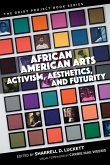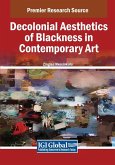Gendered Aesthetics of Blackness delves deeply into the visual artistry and activism of Afro-Cuban women in Cuba and the United States. Influential in their communities yet overlooked in the mainstream art world and academic discourse, Harmonia Rosales, María Magdalena Campos-Pons, Belkis Ayón, and Susana Pilar practice what Rosita Scerbo calls "Decolonial AfroARTivism." These women use their art to challenge and disrupt dominant narratives, reclaim their identities and cultural heritage, and advocate for social justice. In centering their voices and meticulously analyzing their works, Scerbo not only enriches our understanding of Afro-Cuban visual culture but also pushes the boundaries of research. Groundbreaking in its decolonial approach and form, Gendered Aesthetics of Blackness engages a wide swath of sources and includes two interviews, with Rosales and with curator and popular educator Diarenis Calderon Tartabull.
Hinweis: Dieser Artikel kann nur an eine deutsche Lieferadresse ausgeliefert werden.
Hinweis: Dieser Artikel kann nur an eine deutsche Lieferadresse ausgeliefert werden.








